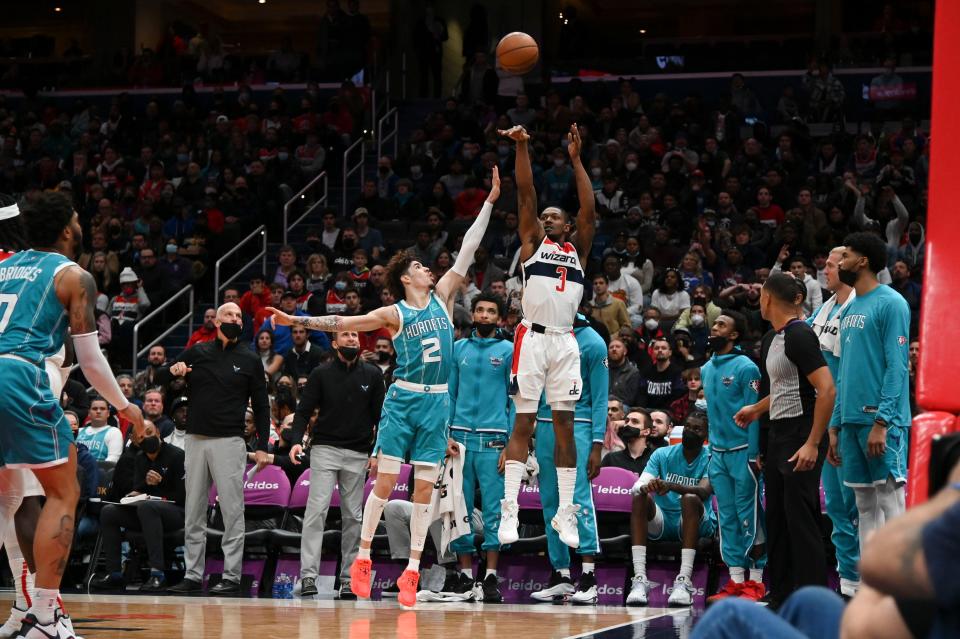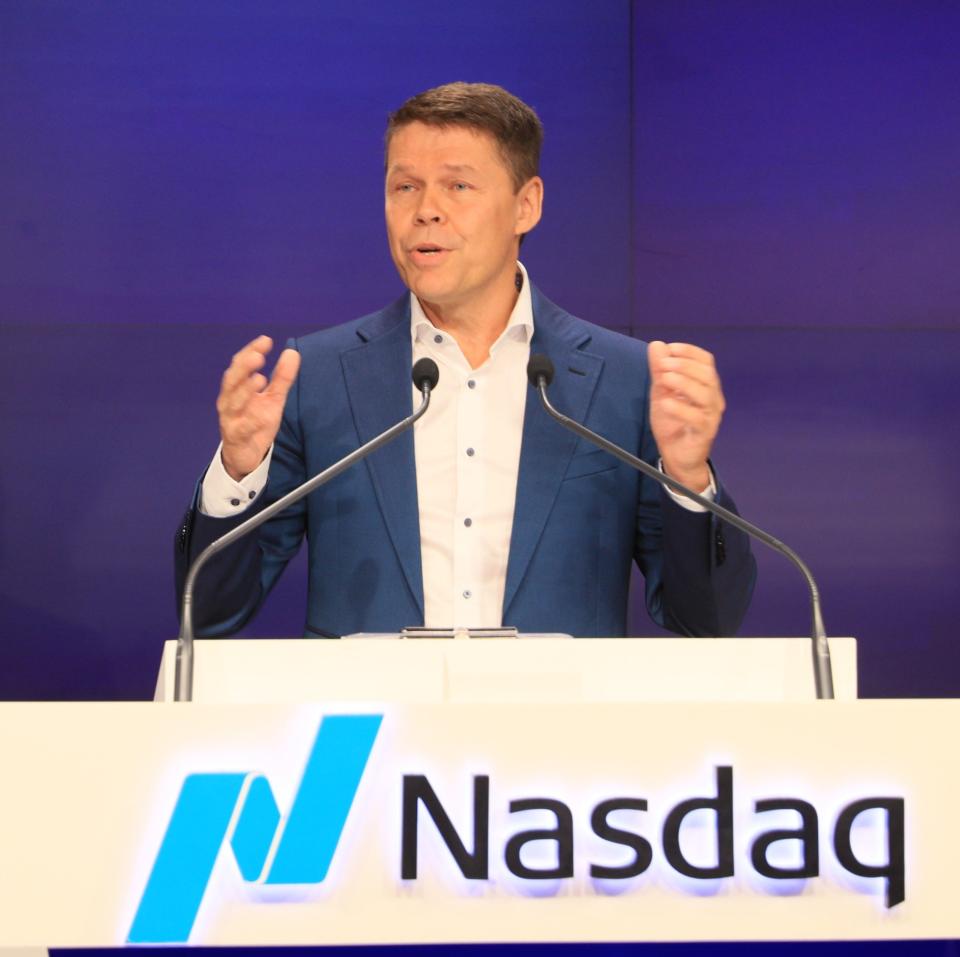Bloomberg of sports gambling? Meet Michael Jordan-backed data company Sportradar
Ted Leonsis walked through an office that looked like it belonged to an investment banking company, past the analysts sitting in front of data terminals, and arrived in the back room of Sportradar’s new U.S.-based headquarters in Minneapolis, Minnesota.
There, Sportradar CEO and co-founder Carsten Koerl showed Leonsis – whose Monumental Sports Group owns the Washington Wizards (NBA), Capitals (NHL) and Mystics (WNBA) – something he’d seen a thousand times and simultaneously never before. It was a replay from an NFL game, a highlight, a 70-yard touchdown run. But instead of watching a simple video the second time, "they rebuild the play into data," Leonsis said.
Another key: it happened in real time. A linebacker moved three inches one direction. The tailback juked the opposite way. That was all it took.
"Seeing what just happened via data is way more enlightening than watching it on television and on video and hearing announcers drone on and on," Leonsis, the CEO and founder of Monumental Sports & Entertainment, told USA TODAY Sports.
WHAT WENT DOWN: How the Wizards came out on top of trade that sent Russell Westbrook to Lakers
NFL POWER RANKINGS: Cardinals reclaim No. 1 spot, but who's leading AFC pack?

Leonsis was an early believer that data for consumers and media partners would change the sports industry. This was in 2015, and he thought the real-time nature would make Sportradar – founded by German entrepreneurs in Switzerland – a leader in the space, especially as the legal sports gambling industry in the United States was on the horizon and has since exploded.
Leonsis recalled writing in a memo: "They could be the Bloomberg of gamification."
Sportradar in center of gambling, media industries
Fast forward six years, and Leonsis’ prediction is panning out. Sportradar launched public stock in September (currently priced around $19 per share) with an $8 billion valuation. The NBA and NHL both hold equity in the company. NBA legend Michael Jordan and Dallas Mavericks owner Mark Cuban are investors, taking part in a $44 million funding round by Revolution Growth – Leonsis’ investment firm – that helped the company establish a U.S.-based operation.
There are three main pillars of Sportradar’s business, Koerl said. The first is its partnerships with leagues and organizations across the world. It is the official provider of real-time league statistics for the NBA and WNBA, for example, and does the same for MLB in international markets. It is also the third-party provider of NHL game data via the league’s proprietary Hockey Information Tracking System (HITS) to media and technology companies across the globe. There are also deals with NASCAR, the International Tennis Federation, UEFA and the International Cricket Council. Sportradar covers 83 sports in more than 120 countries, with 2,300 employees – mostly data scientists – across the globe.
Sportradar says it represents 85% of U.S. bookmakers. Those services range from helping large sportsbooks, like DraftKings and FanDuel, to attract and retain customers by identifying and profiling potential clients, to providing odds, live data and managed trading services.
An example of front-facing Sportradar data gamblers can review are the "Betting Insights" available on the NBA's official wagering website: "The over hit in 4 of the Detroit Pistons last 4 games vs. the Miami Heat since the start of 2019-20" or "the New York Knicks are 5-0 against the spread vs. the Los Angeles Lakers off a loss over their last 5 games."
"The machine at the end is aggregating this data, putting it into products in this ecosystem," Koerl said. "And the more data you have, the better understanding you have, the better you can do you job. A company that did this very, very well is called Amazon."
The company also works with broadcasters around the world, including some regional sports networks (RSNs) in the U.S., to augment the viewership experience.
"All the three pillars – the teams, the leagues, the bookmakers and the entertainment (are) playing together," Koerl told USA TODAY Sports. "And you see so many situations where broadcasters are turning into betting companies and betting companies are turning into media companies and leagues are turning into media companies … so that shows you there are trends this is getting closer together.
"And in the center is Sportradar."
Sherpas and revenues
Revolution Growth theorized that once sports gambling – particularly mobile wagering – became legalized, gaming would become a major revenue stream for teams and leagues. Koerl estimates that it will be a $25-45 billion industry in the next 10 years. States where some variation of sports gambling is legal (29 and the District of Columbia), have generated handles reaching hundreds of millions of dollars, with New Jersey eclipsing the $1 billion mark in September.
The wealth available caused leagues to change their tune on gambling. So Leonsis took Koerl and Sportradar to the NHL, the NBA and the leagues’ respective media partners, with the company entering its first NBA deal in 2016.
"We were their Sherpa, if you will," Leonsis said.
In that case, the journey up the mountain took another pivotal step last week with the NBA and Sportradar announcing an eight-year extension of their partnership that will begin in 2023. Sportico reported the league acquired a 3% equity stake, while the NHL can buy up to a 1.8% stake over the course of its 10-year partnership.
For NBA senior vice president and head of gaming Scott Kaufman-Ross, the main reason behind the partnership extension was to incentivize Sportradar to invest in product innovation.
"We believe there’s a lot of opportunity to improve the experience – not just in sports betting, but in how fans consume data and content," Kaufman-Ross told USA TODAY Sports. "And by aligning ourselves with Sportradar for the long-term, it gives them the necessary runway to make those investments."
The systems are in place to take the next step, Koerl said, but "now you need to boost those systems to integrate."

"It is damn expensive … much more expensive than human beings," he said.
And those investments will likely go toward products that make the live-betting market more robust, as Koerl and Leonsis both think in-game wagering is the next wave. European sports betting is about 20 years ahead of U.S. market in terms of evolution, and it took about 10 to 15 years for live betting to become the more popular version of gaming. He thinks that wave will arrive sooner in the U.S. – within the next three or four years.
"Because live is the much more engaging form of sports (betting)," Koerl said. "It’s much more emotional."
And the marketplace could eventually look like a Wall Street trading floor.
"Why do we not have more liquidity information about the stakes?" Koerl wondered. "Why can we not look to the spread and get that into more kind of a stock trading environment?"
There is one league Sportradar does not have a deal with: the NFL. Genius Sports Group signed an exclusive data deal with the league earlier this year, ending a six-year partnership between Sportradar and the NFL.
Koerl said losing the NFL did not affect revenue; in its third-quarter earnings report, Sportradar said revenue increase by 119% in the U.S. compared to the same quarter last year.
"I see us here in a very strong position because we have long-term contracts with all of the players in this ecosystem, including the leagues … and you can’t get them all," said Koerl, whose goal is to keep Sportradar’s market share above 50%.
"Within all this, I tried to have the clear north star – ‘What happens in the next three, four, five years?’ And not only, ‘What do I do in the next year?’ " Koerl said. "And that’s damn difficult in the global technology business."
Follow Chris Bumbaca on Twitter @BOOMbaca.
This article originally appeared on USA TODAY: Sportradar is sports gambling data giant with Michael Jordan's support

